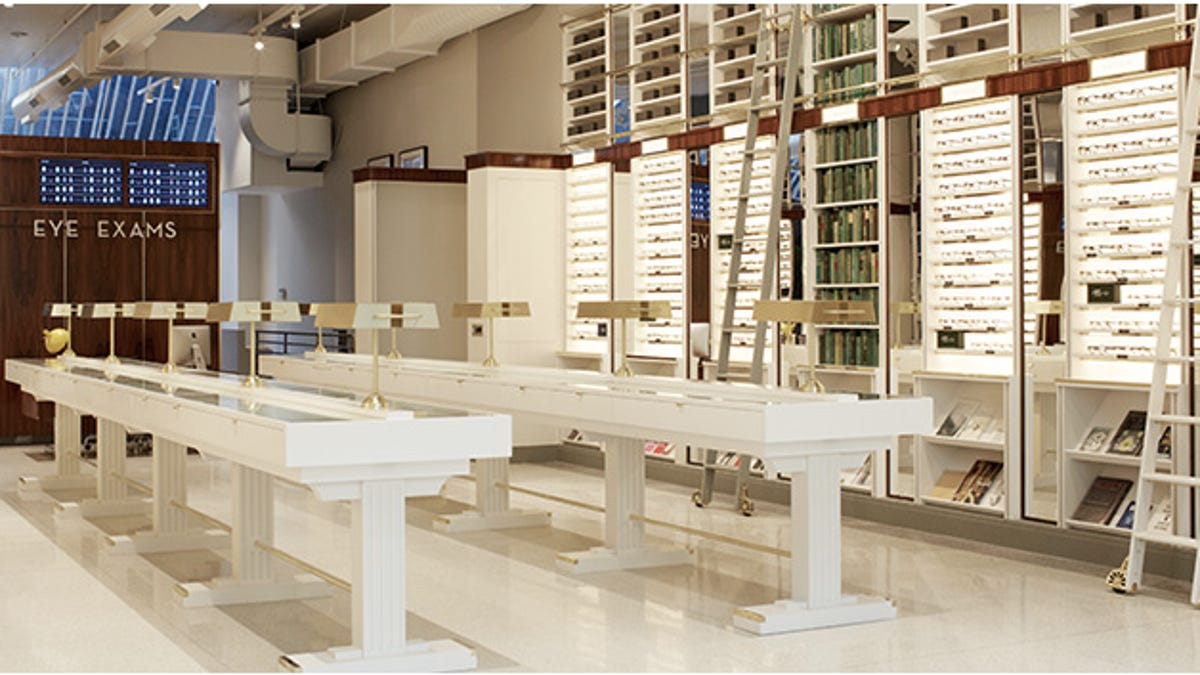Why Google Glass needs help getting to you
If Glass becomes a hit, Google will have to find partners like Warby Parker that can serve the millions of users with stylish frames and prescription lenses.

Google is reportedly talking with eyewear upstart Warby Parker about designing less geeky frames that would include the Glass apparatus. While the optical frame maker could certainly add some fashion to Glass, perhaps making it less cyborg-like, it could also provide an efficient way to sell and distribute Google's wearable computer.
Warby Parker recently opened its first "flagship" shop, located in New York's trendy Soho district. It's a the perfect location to attract the trendy geeks who want to be the first in their hood to don Google's smart glasses.
For Glass buyers requiring prescription lenses, Google has a fulfillment problem that Warby Parker can help solve. Unlike other wearable devices, such as a watches or bands that come in a few colors, acquiring glasses with corrective lenses is far more high touch. You need to choose a frame style, deal with prescription lenses (currently on single vision, no progressive lenses) and get properly fitted. It's not a service that Google is suited to perform.
Read: Glasses and Glass--How Google Glass changed my face
According to the Vision Council's VisionWatch Report on Vision Correction Usage from December 2011, 151.4 million U.S. adults wore prescription eyeglasses, 27.2 million wore over-the-counter readers, 203.3 million wore non-prescription sunglasses, and 26.2 million wore prescription sunglasses. Less than 40 million U.S. adults wear contact lenses.
So far Google and Warby Parker have not confirmed any relationship, but unless Google plans to fully enter the optical dispensary business, it will have to partner with firms that can serve the large community of eyesight impaired people, at least those without contact lenses.
At this juncture, Glass is still in an experimental stage, mounted on the heads of several thousand developers and "explorers" testing out Google's version of augmented reality. With a $1,500 price tag and few apps, Google doesn't have to worry about mass consumption of the device.
But if all goes well, Google plans to offer Glass at lower cost in 2014, moving beyond the explorers to the technophiles, millions of people with a passion for the latest gadgets and who won't be totally distracted by a virtual screen in their view or inflamed by privacy concerns. Warby Parker, with its Amazon-style approach to glasses shopping and growing number of storefronts and showrooms, would be a logical choice to partner with Google.
Like Google, the company was born of the Web, and aided by more than $50 million in funding. It is out to disrupt an industry dominated by Luxottica, which generated more than $9 billion in revenue in 2012. The Italian eyewear giant also owns frame makers Ray Ban and Oakley as well as the thousands of LensCrafters, Sunglass Hut and Pearle Vision stores.
Warby Parker co-founder Neil Blumenthal contends that most glasses are sold for up to 3.5 times their wholesale price. The company sells its prescription glasses for less than $100, which appeals to Google's do-no-evil values.
But Google must have higher hopes for Glass, if it doesn't become more of a footnote in tech history, like Apple's Newton. What Warby Parker would call Luxottica's overpriced Ray Ban and Oakley brands would likely resonate with the more fashion-conscious, well-heeled Google Glass buyers.
If Glass reaches Google scale over the next several years, which is uncertain, Costco and Walmart, which are also major purveyors of eyewear, and new upstarts would want to participate in the smart glasses revolution. By that time, Google will not be the only high-tech company selling a smart-glasses platform. At that point, digital eyewear will be less about choosing a frame and more about choosing who is the keeper of your voluminous data.
See also: Glasses and Glass: How Google Glass changed my face

